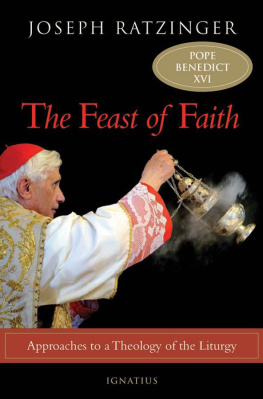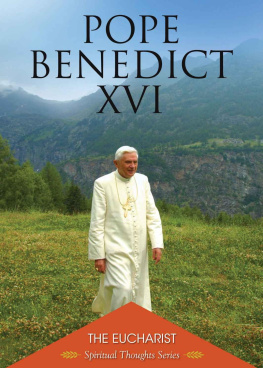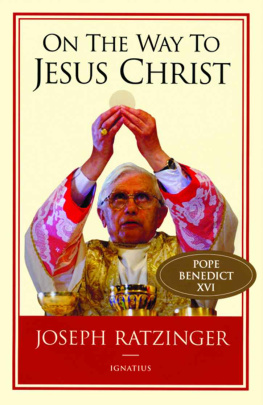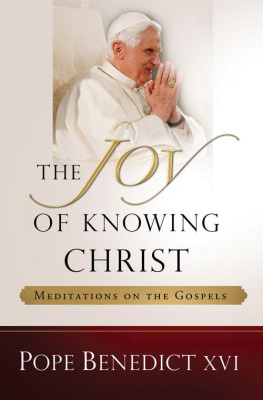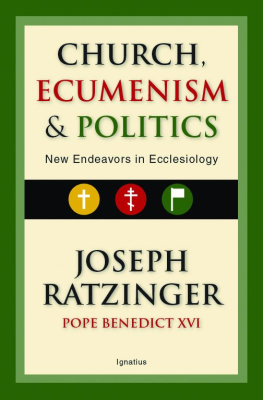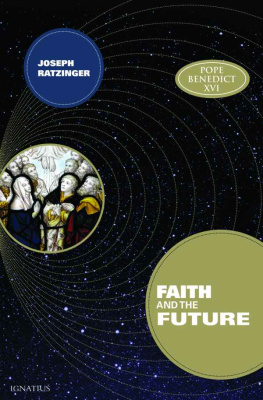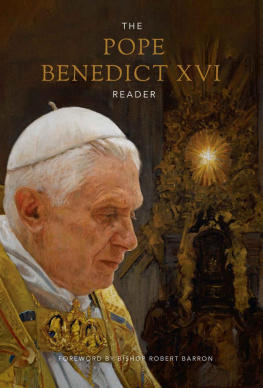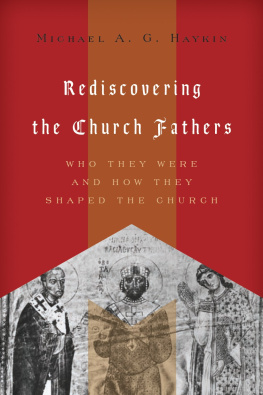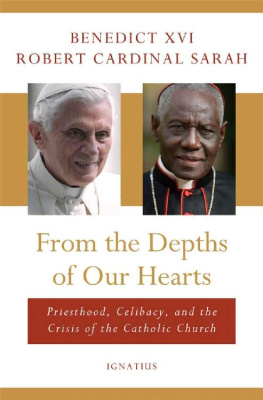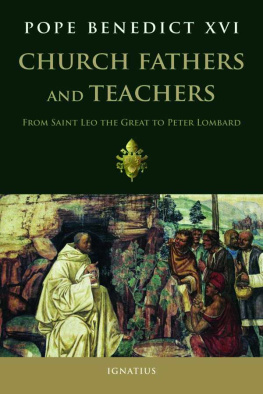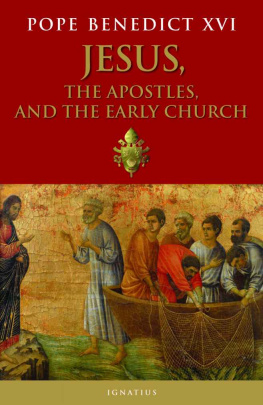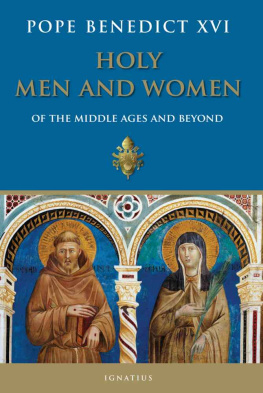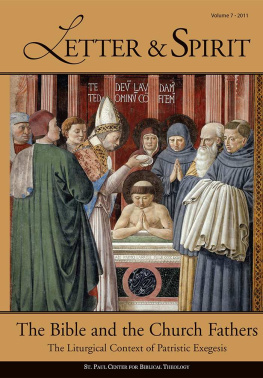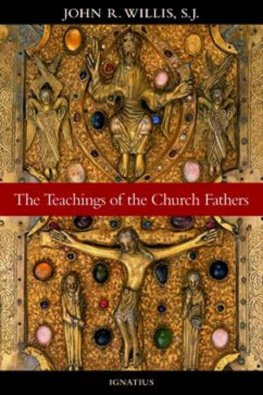Benedict XVI - The Fathers
Here you can read online Benedict XVI - The Fathers full text of the book (entire story) in english for free. Download pdf and epub, get meaning, cover and reviews about this ebook. year: 2008, publisher: Our Sunday Visitor, genre: Religion. Description of the work, (preface) as well as reviews are available. Best literature library LitArk.com created for fans of good reading and offers a wide selection of genres:
Romance novel
Science fiction
Adventure
Detective
Science
History
Home and family
Prose
Art
Politics
Computer
Non-fiction
Religion
Business
Children
Humor
Choose a favorite category and find really read worthwhile books. Enjoy immersion in the world of imagination, feel the emotions of the characters or learn something new for yourself, make an fascinating discovery.

- Book:The Fathers
- Author:
- Publisher:Our Sunday Visitor
- Genre:
- Year:2008
- Rating:4 / 5
- Favourites:Add to favourites
- Your mark:
- 80
- 1
- 2
- 3
- 4
- 5
The Fathers: summary, description and annotation
We offer to read an annotation, description, summary or preface (depends on what the author of the book "The Fathers" wrote himself). If you haven't found the necessary information about the book — write in the comments, we will try to find it.
The Fathers — read online for free the complete book (whole text) full work
Below is the text of the book, divided by pages. System saving the place of the last page read, allows you to conveniently read the book "The Fathers" online for free, without having to search again every time where you left off. Put a bookmark, and you can go to the page where you finished reading at any time.
Font size:
Interval:
Bookmark:
POPE BENEDICT XVI
Our Sunday Visitor Publishing Division
Our Sunday Visitor, Inc.
Huntington, Indiana 46750
The Scripture citations contained in this work are taken from the Catholic Edition of the Revised Standard Version of the Bible (RSV), copyright 1965 and 1966 by the Division of Christian Education of the National Council of the Churches of Christ in the United States of America. Used by permission.
All rights reserved.
Copyright 2008 Libreria Editrice Vaticana
Copyright 2008 by Our Sunday Visitor Publishing Division
Our Sunday Visitor, Inc. Published 2008
13 12 11 10 09 08 1 2 3 4 5 6 7 8 9
ISBN: 978-1-59276-440-2 (Inventory No. T677)
LCCN: 2008932971
Cover design by Tyler Ottinger
Interior design by Sherri L. Hoffman
Cover art: St. Jerome and St. Augustine
Carlo Crivelli (1435/40-1493)
Accademia, Venice, Italy
Cameraphoto Arte, Venice / Art Resource, NY
PRINTED IN THE UNITED STATES OF AMERICA
St. Clement, Bishop of Rome
Let us now devote our attention to the Apostolic Fathers; that is, to the first and second generations in the Church subsequent to the Apostles. And thus, we can see where the Church's journey begins in history.
St. Clement, Bishop of Rome in the last years of the first century, was the third Successor of Peter, after Linus and Anacletus. The most important testimony concerning his life comes from St. Irenaeus, Bishop of Lyons until 202. He attests that Clement had seen the blessed Apostles, had been conversant with them, and might be said to have the preaching of the apostles still echoing [in his ears], and their traditions before his eyes.
Later testimonies that date back to between the fourth and sixth centuries attribute to Clement the title of martyr.
The authority and prestige of this Bishop of Rome were such that various writings were attributed to him, but the only one that is certainly his is the Letter to the Corinthians. Eusebius of Caesarea, the great archivist of Christian beginnings, presents it in these terms: There is extant an epistle of this Clement which is acknowledged to be genuine and is of considerable length and of
An almost canonical character was attributed to this letter. At the beginning of this text written in Greek Clement expressed his regret that the sudden and successive calamitous events which have happened to ourselves had prevented him from intervening sooner. These calamitous events can be identified with Domitian's persecution; therefore, the letter must have been written just after the Emperor's death and at the end of the persecution that is, immediately after the year 96.
Clement's intervention we are still in the first century was prompted by the serious problems besetting the Church in Corinth: the elders of the community, in fact, had been deposed by some young contestants. The sorrowful event was recalled once again by St. Irenaeus who wrote: In the time of this Clement, no small dissension having occurred among the brethren in Corinth, the Church in Rome dispatched a most powerful Letter to the Corinthians exhorting them to peace, renewing their faith, and declaring the tradition which it had lately received from the Apostles.
Thus, we could say that this letter was a first exercise of the Roman primacy after St. Peter's death. Clement's letter touches on topics that were dear to St. Paul, who had written two important letters to the Corinthians, in particular the theological dialectic, perennially current, between the indicative of salvation and the imperative of moral commitment.
First of all came the joyful proclamation of saving grace. The Lord forewarns us and gives us his forgiveness, gives us his love and the grace to be Christians, his brothers and sisters.
It is a proclamation that fills our life with joy and gives certainty to our action: the Lord always forewarns us with his goodness, and the Lord's goodness is always greater than all our sins.
It is a proclamation that fills our life with joy and gives certainty to our action: the Lord always forewarns us with his goodness, and the Lord's goodness is always greater than all our sins.
However, we must commit ourselves in a way that is consistent with the gift received and respond to the proclamation of salvation with a generous and courageous journey of conversion.
In comparison with the Pauline model, the innovation added by Clement is to the doctrinal and practical sections, which constituted all the Pauline letters, a great prayer that virtually concludes the letter.
The letter's immediate circumstances provided the Bishop of Rome with ample room for an intervention on the Church's identity and mission. If there were abuses in Corinth, Clement observed, the reason should be sought in the weakening of charity and of the other indispensable Christian virtues.
He therefore calls the faithful to humility and fraternal love, two truly constitutive virtues of being in the Church: Seeing, therefore, that we are the portion of the Holy One, he warned, let us do all those things which pertain to holiness.
In particular, the Bishop of Rome recalls that the Lord himself, where and by whom he desires these things to be done, he himself has fixed by his own supreme will, in order that all things,
In this way, referring to the liturgy of ancient Israel, Clement revealed his ideal Church. She was assembled by the one Spirit of grace poured out upon us which breathes on the various members of the Body of Christ, where all, united without any divisions, are members of one another.
The clear distinction between the lay person and the hierarchy in no way signifies opposition, but only this organic connection of a body, an organism with its different functions. The Church, in fact, is not a place of confusion and anarchy where one can do what one likes all the time: each one in this organism, with an articulated structure, exercises his ministry in accordance with the vocation he has received.
With regard to community leaders, Clement clearly explains the doctrine of Apostolic Succession. The norms that regulate it derive ultimately from God himself. The Father sent Jesus Christ, who in turn sent the Apostles. They then sent the first heads of communities and established that they would be succeeded by other worthy men.
Everything, therefore, was made in an orderly way, according to the will of God. With these words, these sentences, St. Clement underlined that the Church's structure was sacramental and not political.
The action of God who comes to meet us in the liturgy precedes our decisions and our ideas. The Church is above all a gift of God and not something we ourselves created; consequently, this sacramental structure does not only guarantee the common order but also this precedence of God's gift which we all need.
Finally, the great prayer confers a cosmic breath to the previous reasoning. Clement praises and thanks God for his marvelous providence of love that created the world and continues to save and sanctify it.
The prayer for rulers and governors acquires special importance. Subsequent to the New Testament texts, it is the oldest prayer extant for political institutions. Thus, in the period following their persecution, Christians, well aware that the persecutions would continue, never ceased to pray for the very authorities who had unjustly condemned them.
The reason is primarily Christological: it is necessary to pray for one's persecutors as Jesus did on the Cross.
But this prayer also contains a teaching that guides the attitude of Christians toward politics and the state down the centuries. In praying for the authorities, Clement recognized the legitimacy of political institutions in the order established by God; at the same time, he expressed his concern that the authorities would be docile to God, devoutly in peace and meekness exercising the power given them by [God].
Font size:
Interval:
Bookmark:
Similar books «The Fathers»
Look at similar books to The Fathers. We have selected literature similar in name and meaning in the hope of providing readers with more options to find new, interesting, not yet read works.
Discussion, reviews of the book The Fathers and just readers' own opinions. Leave your comments, write what you think about the work, its meaning or the main characters. Specify what exactly you liked and what you didn't like, and why you think so.

